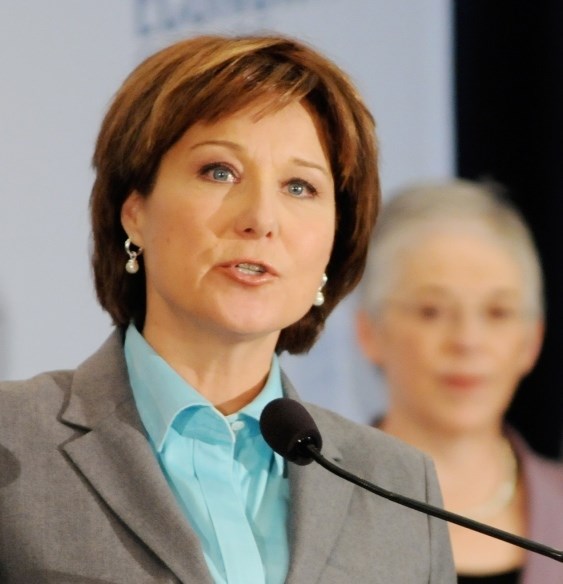In a strongly worded letter to Mayor Gregor Robertson Thursday, Premier Christy Clark says the City of Vancouver could do more to create affordable housing by resorting to better land use planning and lowering fees and levies for new homes.
Clark made the recommendations in response to Mayor Gregor Robertson’s May 22 letter that requested the B.C. government build more housing and implement a tax to penalize property speculators and increase the property transfer tax on luxury homes.
“Using any method of new taxation with the goal of driving down the price of housing could have the unintended effect of hurting current homeowners across the region,” Clark said in her letter, which was circulated to various news outlets, including the Courier. “Driving down the cost of housing by just 10 per cent would mean a family with a home currently worth $800,000, could lose $80,000 in equity in their home. That could put some homeowners with large mortgages into negative equity.”
Spreading that same 10 per cent calculation across Greater Vancouver, roughly $60 billion in home equity would be lost, according to a Ministry of Finance analysis of the real estate market, which was attached to Clark’s letter.
While acknowledging she shares a concern with the cost of housing in Vancouver, Clark pointed to a report done last year by the Urban Development Institute that estimated Vancouver’s civic fees and levies add $76,144 to the price of a new condo unit worth roughly $450,000.
She added that “beyond any new taxes to curb demand, there is also the option of increasing supply through better land use planning.”
The Ministry of Finance analysis said the B.C government could encourage local governments to address affordability through local taxes and planning measures such as:
• Adopting growth strategies and plans that encourage affordable housing units.
• Nurturing a regulatory environment that is “housing-friendly” and encourages densification.
• Offering property tax incentives and targeted reductions to build or renovate affordable housing.
• Streamlining development approval processes.
The mayor pointed out in his letter that the city has set aside $61 million in this year’s capital plan to invest in housing and to support its affordable housing agency.
The city also continues to offer incentives to developers to build rental housing, a program that works without provincial or federal government money.
In urging the premier to partner with the city to build new affordable housing geared to families, first-time buyers and seniors, Robertson said “the single biggest step” the B.C. government could make to address soaring housing costs is to generate thousands of new housing units that are affordable for lower and middle-income taxpayers.
“The rapidly escalating housing prices in Vancouver are creating despair on the part of many hard working, middle-income citizens and families,” he wrote in his letter. “I hear on a daily basis from young people who are educated, have good-paying jobs, but are unable to find quality rental housing in a near-zero vacancy market, and who are not even within shouting distance of being able to buy in Vancouver.”
Addressing concerns over foreign investment driving up housing prices, Clark said industry experts estimate that local investors are doing most of the real estate speculation in the region.
“Those experts estimate that local investors are three to four times more active in the region’s housing market than foreign investors,” she said. “For many individuals and small businesses, this is a source of investment income.”
In its analysis, the Ministry of Finance researched other cities around the world that have implemented different forms of tax measures aimed at real estate speculators.
In Singapore, for example, its government implemented nine successive cooling measures between September 2009 and December 2013, including a speculation tax on properties held for less than four years and an increased land transfer tax on residents and non-residents.
“In terms of affordability, Singapore is not a success story,” the Ministry of Finance concluded. “Singapore has managed to halt a rapid increase in house prices. However, an individual unable to afford a home in 2009 remains unable to afford a home in 2015. The growth in house prices in Singapore over that period outpaced the growth in incomes. In addition to higher house prices, that individual now faces restrictions on their ability to borrow and may face higher property transfer taxes either directly, or passed on by the seller.”
Clark concluded her letter to the mayor, saying “I look forward to working with you, sharing our information and examining the various options available to the City and the Province to make housing more affordable in Vancouver, especially for first-time buyers.”
The Courier contacted the mayor's office Friday but was told via email that Robertson was attending a Federation of Canadian Municipalities' conference in Edmonton. His office sent the following statement to the Courier from acting-mayor Raymond Louie:
"As the mayor's letter and all of his public statements have indicated, our focus has not been on foreign ownership, but rather investor speculation and a lack of affordability that is leaving behind far too many Vancouver families and putting our economy at risk. While the premier has talked about hypothetical major declines in equity, our own proposals have been squarely focused on getting new affordable housing built and slowing down the unsustainable "growth" in housing prices — which are clearly out of pace with the rest of Canada and the world.We look forward to continuing an important dialogue and partnership with the Province on how they can help invest and provide the tools we need to build urgently needed affordable housing — reflecting our commitment to a Vancouver in which people of all backgrounds can afford to live, contribute to our economy, and raise a family."
@Howellings



